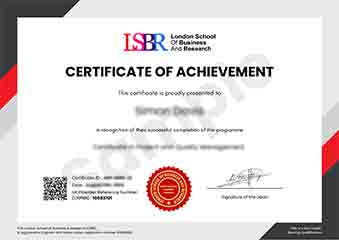Professional Qualification
Postgraduate Certificate in Navigating Language Differences in Medical Emergencies
Navigate complex medical emergencies with confidence by developing skills to communicate effectively across languages and cultures.
Postgraduate Certificate in Navigating Language Differences in Medical Emergencies
£99
• 2 MonthsCourse Overview
This course is designed for medical professionals, interpreters, and emergency responders who interact with patients from diverse linguistic backgrounds. It caters to those seeking to enhance their communication skills in high-stakes medical emergencies. Consequently, participants from various healthcare settings will benefit from this program.
Upon completion, students will gain practical strategies for effective communication across language barriers. They will develop skills in identifying and mitigating potential miscommunications, using interpreters, and adapting to diverse cultural contexts. Moreover, they will acquire knowledge of relevant policies and protocols, ultimately improving patient outcomes in medical emergencies.
Description
Navigate Language Barriers, Save Lives
In high-pressure medical emergencies, language differences can be a matter of life and death. Our Postgraduate Certificate in Navigating Language Differences in Medical Emergencies equips you with the skills to communicate effectively across linguistic and cultural divides.
Enhance Your Career
Gain a competitive edge in the healthcare industry, with career opportunities in hospitals, clinics, and emergency services. As a healthcare professional, you'll develop the expertise to provide high-quality care to diverse patient populations.
Unique Features
Interactive online modules and real-life case studies
Expert instruction from experienced healthcare professionals
Flexible, part-time study to accommodate your schedule
Collaborative learning environment with peers from diverse backgrounds
Practical skills to navigate language barriers in high-stress situations.
Key Features
Quality Content
Our curriculum is developed in collaboration with industry leaders to ensure you gain practical, job-ready skills that are valued by employers worldwide.
Created by Expert Faculty
Our courses are designed and delivered by experienced faculty with real-world expertise, ensuring you receive the highest quality education and mentorship.
Flexible Learning
Enjoy the freedom to learn at your own pace, from anywhere in the world, with our flexible online learning platform designed for busy professionals.
Expert Support
Benefit from personalized support and guidance from our expert team, including academic assistance and career counseling to help you succeed.
Latest Curriculum
Stay ahead with a curriculum that is constantly updated to reflect the latest trends, technologies, and best practices in your field.
Career Advancement
Unlock new career opportunities and accelerate your professional growth with a qualification that is recognized and respected by employers globally.
Topics Covered
- Language Barriers in Medical Emergencies: Understanding the challenges posed by language differences in high-pressure situations.
- Cross-Cultural Communication Fundamentals: Exploring principles of effective communication across diverse cultural backgrounds.
- Medical Terminology and Interpreting: Mastering medical vocabulary and interpreting techniques for accurate communication.
- Navigating Language Differences in Crisis Situations: Developing strategies for managing language barriers in emergency response scenarios.
- Technology and Tools for Language Support: Evaluating technology and tools for facilitating language support in medical emergencies.
- Collaborative Practice in Multilingual Environments: Fostering collaboration among healthcare professionals in linguistically diverse settings.
Key Facts
Overview
Designed for healthcare professionals working in multilingual settings, this postgraduate certificate enhances communication skills in medical emergencies.
Key Details
Audience: Healthcare professionals, paramedics, and emergency responders.
Prerequisites: Bachelor's degree in a healthcare field, or equivalent experience.
Outcomes
Develop effective communication strategies in diverse settings.
Improve patient safety through clear language use.
Enhance cultural competence in emergency situations.
Apply best practices in language-accessible care.
Why This Course
Learners should choose the 'Postgraduate Certificate in Navigating Language Differences in Medical Emergencies' to enhance their skills. This program is ideal for healthcare professionals. Furthermore, it addresses the critical need for effective communication.
Here are three key benefits:
Develops cross-cultural communication skills to provide better care.
Enhances patient safety and satisfaction in emergency situations.
Prepares learners to work effectively in diverse healthcare settings.
Course Brochure
Download the detailed course brochure to learn more about Postgraduate Certificate in Navigating Language Differences in Medical Emergencies
Download BrochurePay as an Employer
Request an invoice for your company to pay for this course. Perfect for corporate training and professional development.
Sample Certificate
Preview the certificate you'll receive upon successful completion of this program.

Flexible Learning
24/7 Support
Enrol & Start Anytime
Recommended Learning Hours : 2-4 Hrs/Week
100% Online
Corporate Invoicing Available
What People Say About Us
Hear from our students about their experience with the Postgraduate Certificate in Navigating Language Differences in Medical Emergencies at HealthCareCourses.
Charlotte Williams
United Kingdom"This course has been a game-changer for my career as a healthcare professional, providing me with a deep understanding of the complexities of language differences in medical emergencies and the skills to navigate these situations effectively. The course material is comprehensive and well-structured, covering everything from cultural competency to communication strategies, and has given me the confidence to work with patients from diverse linguistic backgrounds. Overall, I feel much better equipped to provide high-quality care in a multicultural setting."
Liam O'Connor
Australia"This course has significantly enhanced my ability to communicate effectively with patients from diverse linguistic backgrounds, allowing me to provide more accurate and timely care in high-pressure medical situations. The skills I've developed have been invaluable in my current role as a medical interpreter, enabling me to facilitate smoother transitions between healthcare teams and patients. As a result, I've been able to take on more responsibilities and contribute to the development of more culturally sensitive care protocols within my organization."
Madison Davis
United States"The course structure effectively balanced theoretical foundations with practical case studies, allowing me to develop a nuanced understanding of language differences in medical emergencies. The comprehensive content has significantly enhanced my ability to communicate effectively with patients from diverse linguistic backgrounds, which I believe will greatly benefit my professional growth as a healthcare provider."
More Courses You Might Like
Explore similar courses to expand your learning journey
From Our Blog
Insights and stories from our business analytics community
The Ethics of Navigating Language Differences in Medical Emergencies
Navigating language differences in medical emergencies requires effective communication skills to ensure quality care and prevent patient harm.
Revolutionizing Healthcare Communication: The Evolution of Postgraduate Certificates in Navigating Language Differences in Medical Emergencies
Discover how Postgraduate Certificates in Navigating Language Differences in Medical Emergencies are revolutionizing healthcare communication with cutting-edge language technology and cultural competence.
Navigating Language Differences in Medical Emergencies Value Creation
"Break language barriers in medical emergencies with our expert training, equipping healthcare pros with the skills to save lives in high-pressure situations."

